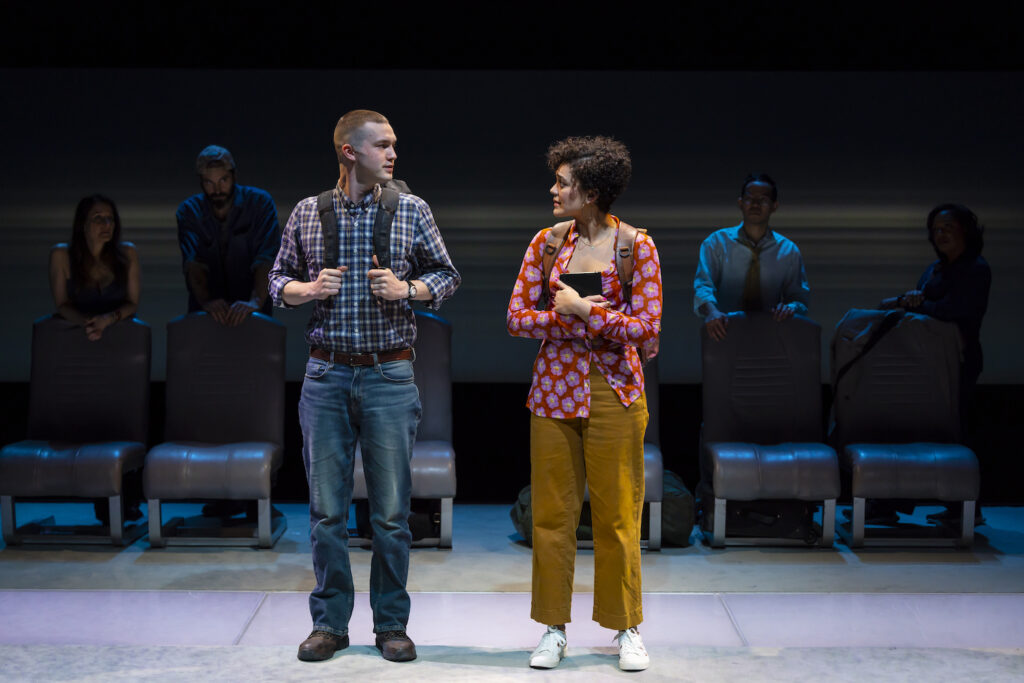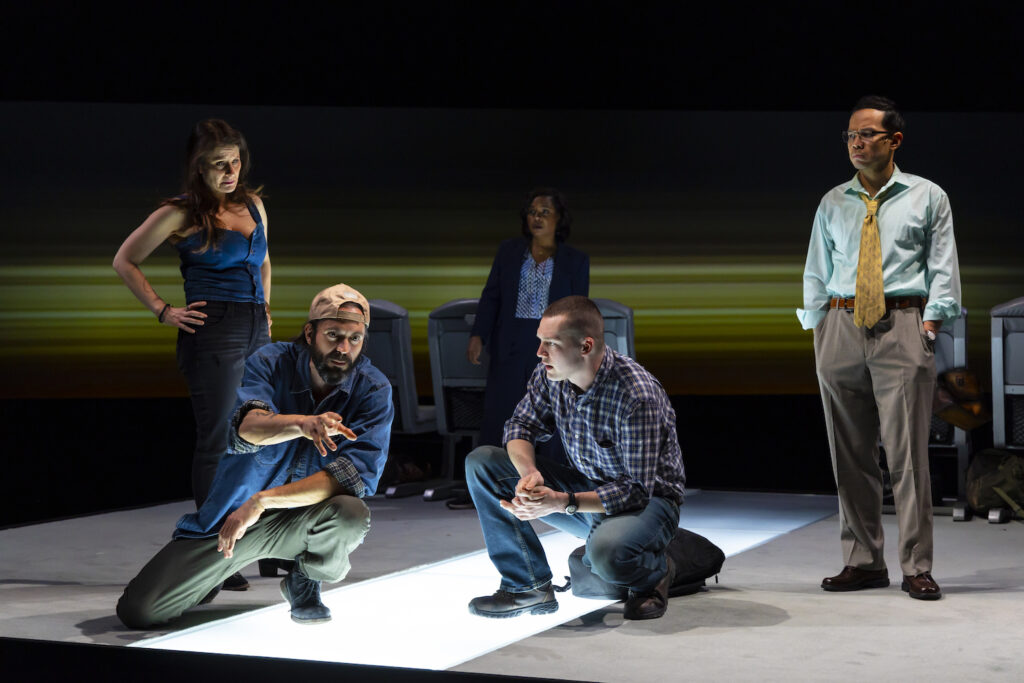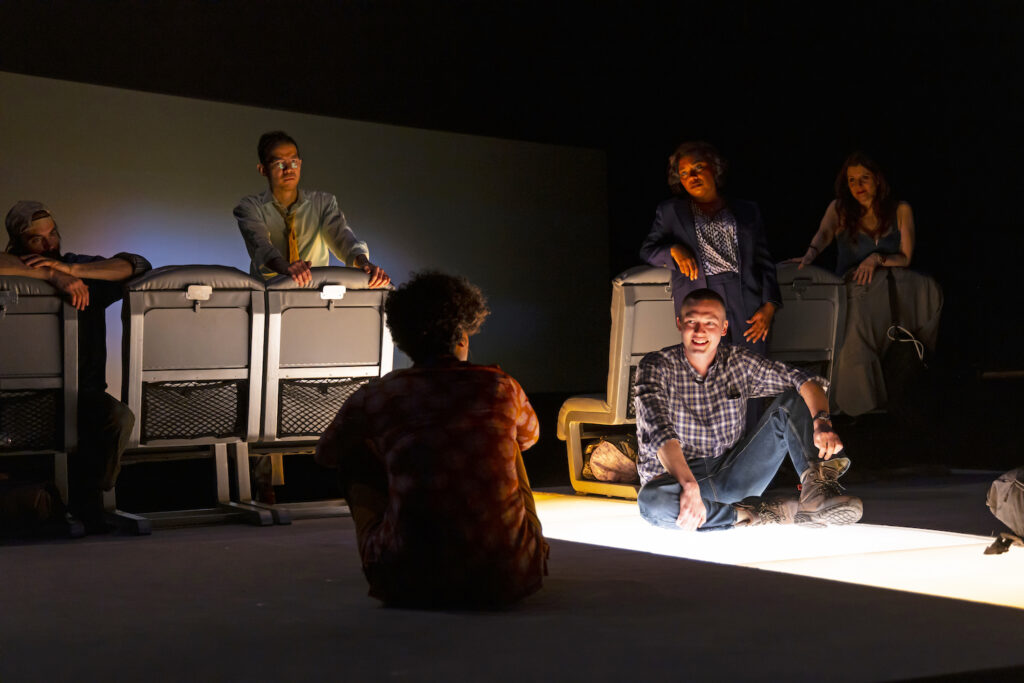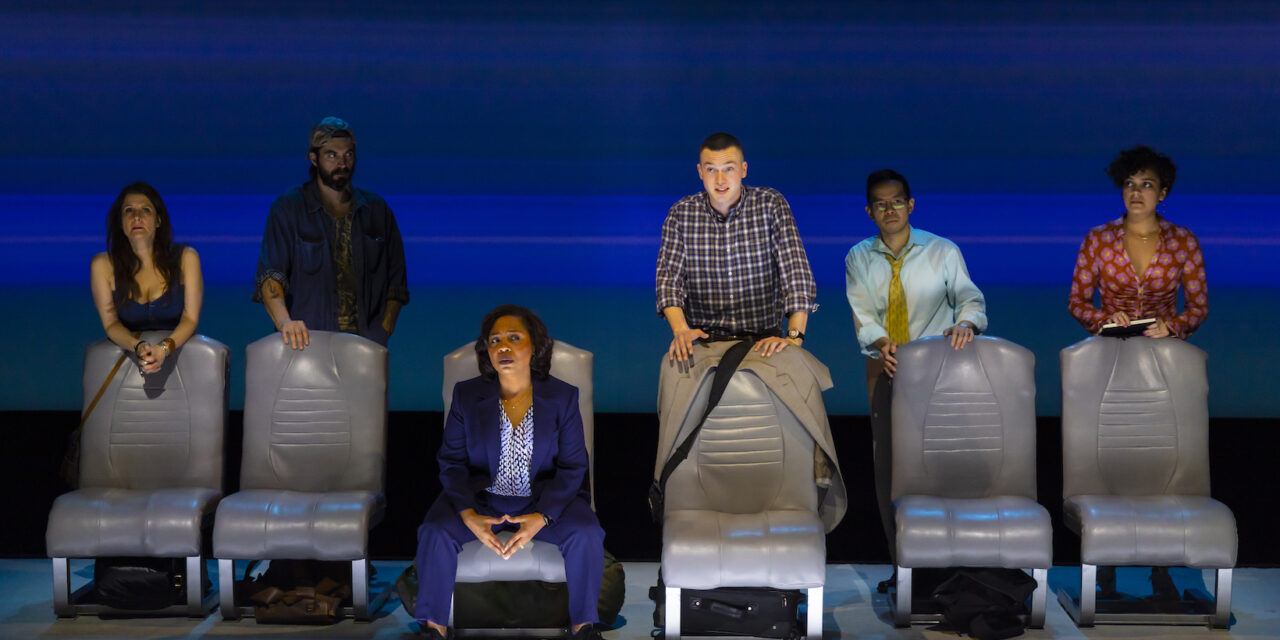By Carole Di Tosti . . .
The Coast Starlight is advertised as a grand west coast Amtrak train adventure, whose overnight sleeper travels daily from Los Angeles to Seattle. It is also the title of Keith Bunin’s 90-minute play The Coast Starlight, thoughtfully directed by Tyne Rafaeli for maximum poignance, especially at the conclusion. Currently running at Lincoln Center Theater’s Mitzi E. Newhouse Theater without an intermission, Bunin’s affecting, meditative, sometimes comedic play is about six passengers whose reality and imaginative conversations meld seamlessly and strikingly into a series of “if-then.”
These conversations, which mostly take place in states of consciousness, never happen in reality. The uttered dialogue represents the thoughts of six characters who travel for over thirty hours in the same rail car. They barely interact with each other over the extended time they are together and share that space. There are moments when they do get up to leave for the observation car or the sleeper car, but the bulk of their time is spent sitting with their own thoughts.

However, if they could transcend the chasm of isolation, fear and insularity, we learn what they would say, and thus find out who they are in their humanity, dignity and concern for others. Bunin’s most vital theme points to missed opportunities we might have with others, if we opened our inner selves, shared our sensitivities, and overcame our fears of rejection and self-dislocation.
T. J. (Will Harrison in a spot-on portrayal) is the central figure around whom the others connect in Bunin’s surreal conversations. T.J.’s tension is palpable because he is on a mission whose secret we eventually discover. The other characters are traveling for less urgent reasons, but each manifests the need to escape, leaving a painful situation behind in the hope of discovering a better life, as they try to evolve beyond unhappiness and the issues they must confront.
The first passenger T.J. meets in the surrealist realm is the artist Jane (the buoyant Camila Canó-Flaviá), who loves to draw, and is working her craft by capturing the likenesses of the passengers, beginning with T.J. She plans to visit her boyfriend, Scott, in Seattle. Former Afghanistan soldier and veteran Noah (Rhys Coiro) immediately senses who T.J. is from his posture and haircut. Noah is traveling to Klamath Falls, Oregon to visit his senile mother. Liz (the brilliantly funny Mia Barron) is escaping from “The Extraordinary Couples’ Workshop,” which Liz says is run by the Human Awareness Institute and is complete “horseshit.” Barron’s performance brings down the house with some of Bunin’s most humorous dialogue.


Inflammatory drunk, Ed (Jon Norman Schneider), who must be calmed down by T.J., reveals his job dissatisfaction and economic plight when he summarizes his desperate struggle to care for his family. Dunsmuir, California, where he alights, is one more destination on Ed’s track of unfulfilled dreams that suck out his humanity. Anna (Michelle Wilson) is returning to her family after finalizing a situation with her brother.
The ensemble does a terrific job portraying the lives of their characters. A number of them worked on the play since its 2019 premiere at the La Jolla Playhouse, but all of them give believable, interesting portrayals as they negotiate Tyne Rafaeli’s staging around Arnulfo Maldonado’s set.
Maldonado’s set design includes a revolving platform holding plush gray recliners with matching flooring. There is an accompanying screen. On this “window” appear projections by 59 Productions. These variably suggest colors that symbolize the landscape of the west coast and ocean. With costumes by Ásta Bennie Hostetter, lighting by Lap Chi Chu, and Daniel Kluger’s original music and sound design, Rafaeli’s vision works to elucidate Bunin’s themes about appreciating the value of others and not being tempted to ignore them like strangers we can never know.


The production heightens paradoxes. There is movement in the stasis of the passengers who infrequently get up from their chairs to address the audience or each other in their imaginations. The revolving stage is ironic in its circularity, suggesting the passage of time as well as the characters mentally going in circles with their problems. Meanwhile, the train speeds in forward motion.
Bunin emphasizes the irony that spatial closeness prohibits sociability in the sleeper car. When humans are on top of one another, they seek anonymity and go into “remote” mode. If only passengers moved from their comfortable insularity to reach out to the reality of their fellows! What might happen? Bunin ingeniously shows us, and gives us pause in his intriguing play, as the actors drive home his profound theme.
The Coast Starlight. Through April 16 at Lincoln Center Theater’s Mitzi E. Newhouse Theater (150 West 65th Street at Columbus Avenue). www.lct.org
Photos: T. Charles Erickson


















